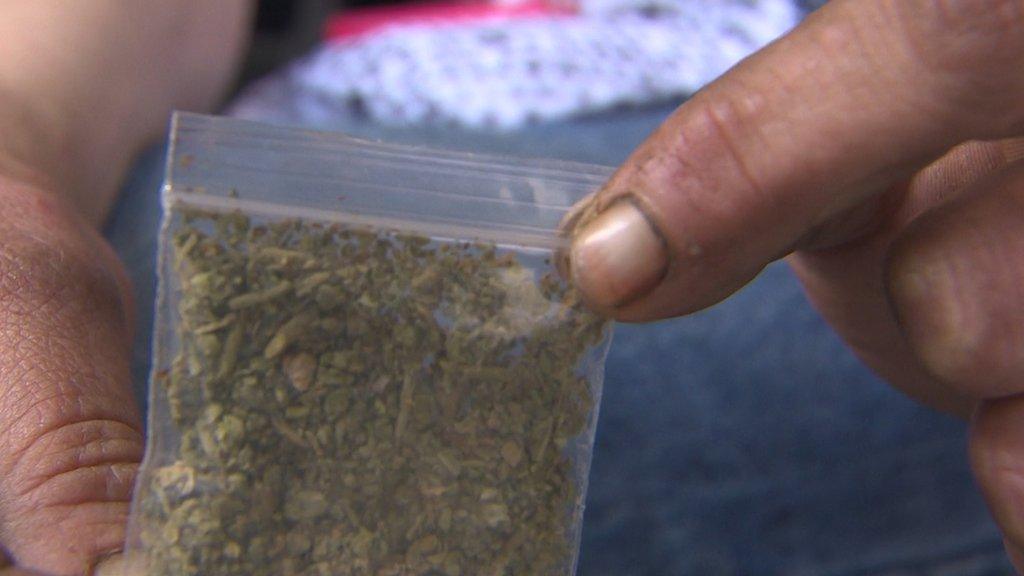Spice: Police 'helpless' against psychoactive drug
- Published

Drugs worker Tony Ormond says the psychoactive substance Spice is a "mental health timebomb".
Police across the UK feel "helpless" in the fight against the former legal high Spice, a senior officer has said.
North Wales Police Ch Insp Dave Jolly told ┤ˇ¤ˇ┤ź├Ż 5 live new psychoactive substances are the biggest challenge he has faced in his 29-year career.
Spice is a term for a range of new psychoactive substances which the government banned in May 2016.
Until then they were known as "legal highs" and available to buy in High Street "head shops".
They are designed to mimic the effects of cannabis, but affect the brain differently - and can have severe debilitating effects.
Physically addictive
Several regions of England and Wales are reporting major issues with people addicted to these former legal highs. Greater Manchester Mayor Andy Burnham has warned of a risk to public safety unless more funding is provided to deal with the issue.
Commander Simon Bray from the National Police Chiefs' Council says the drug is a "significant challenge" for specific hotspot areas, with homeless communities in Manchester, Birmingham, parts of London and Newcastle affected.
He said enforcement activity was working to deal with the issue, but said "it can't just be about policing".
East Midlands Ambulance Service says it has had to deal with nearly 200 callouts related to synthetic highs in the first two weeks of August
Tony Ormond, a former heroin addict who now works as substance misuse service user involvement co-ordinator in north Wales, agrees and has called for long-term planning.
"Mental health services are under-resourced as it is and over-populated," he told ┤ˇ¤ˇ┤ź├Ż 5 live.
"We need to forecast that this is potentially a mental health timebomb for five to 10 years, that it's going to put extra strain on mental health. But in the short term, I think we need to combat it with love, compassion and understanding."
A 22-year-old Spice user from Wrexham says that the drug became more popular before it became illegal because it was cheaper than cannabis.
"It's made me homeless," he said, "It sort of stops the shakes and the coldness in your body. It's physically addictive, definitely."
'Devastating impact'
Concerns have been raised in the East Midlands, particularly in Derby - where a mobile police station has been set up to deal with the issue.
The East Midlands Ambulance Service says it has seen an increase in activity and, in the first two weeks of August, it had to deal with 188 callouts related to people who had taken synthetic highs in Derby and Nottingham.
The North East Ambulance Service has provided figures to the ┤ˇ¤ˇ┤ź├Ż showing an increase in the number of callouts relating to former legal highs since they were banned, with more than 100 incidents per month (compared with about 60 last June).
Ch Insp Jolly said: "I've got over 29 years. I see it as probably the most significant challenge in policing, certainly in Wrexham.
"And having spoken to people across the UK who are feeling the same pain from these chaotic users, I think we're all feeling slightly helpless around how we are we going to actually work through this challenge."
In a statement, the Home Office said it recognised how dangerous substances such as Spice and Black Mamba could be and the "devastating impact that they can have on our communities, families and the individuals taking them" and that was why they had been banned.
"Since we introduced the landmark Psychoactive Substances Act we have seen use of these substances fall significantly, hundreds of retailers shut, and the first offenders convicted," a spokesman added.